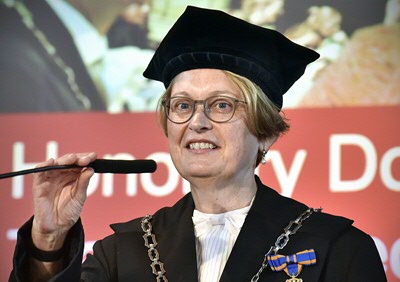‘A good university is an international university’
The core business of Dutch universities is to prepare students for their future: a career in our open, internationally oriented society and knowledge economy. To this end, all Dutch universities have an international perspective firmly entrenched in their degree programmes. They do this by examining academic and social issues in an international context, for example, and by encouraging Dutch students to follow course units or placements abroad and conversely, by welcoming international students to their own programmes. An academic programme that fails to offer enough international perspective will be devoid of the quality and relevance needed for the job market and society.
Balance is essential if universities are to achieve successful international orientation. There are three basic priorities in this respect: quality, customization and inclusiveness.

It is of paramount importance to all universities that internationalization continues to enhance the quality of teaching and research. Consider for a moment football clubs, which raise the level of their game (and Dutch football as a whole) by including foreign players and coaches in their teams. Conversely, Dutch players often go abroad to play in foreign leagues, where they develop their skills and return to the Netherlands with a wealth of experience. These days, you couldn’t imagine a club in the Dutch Premier League only fielding Dutch players. Although the fact that the economics of these exchanges (at universities and in football) are also beneficial - international students studying in the Netherlands generate more for the Dutch economy than they cost – is an additional advantage, it is not the main goal: the real aim is to circulate national and international knowledge and talent.
Customization is just as important. Different fields and professions demand different skills: a future lawyer is expected to acquire very different competencies than a prospective surgeon or astronomer. However, they do have one thing in common. In their work, they will always encounter clients and colleagues from other countries and must therefore be able to view the world from a global perspective. A doctor working in the Netherlands also treats patients from other countries, a lawyer assists multinationals and SME companies with markets throughout the world, and an astronomer not only looks beyond national borders, but also studies the entire universe. This is all thanks to the knowledge and infrastructure they share with international partners. So we decide where to put the emphasis for each discipline separately, thus ensuring the best possible education for our students.
Finally, internationalization and inclusiveness go hand in hand. Universities must be open and accessible. In other words, open to all students and academics regardless of origin, status, religious or sexual orientation and irrespective of whether your parents enjoyed an academic education or you are the first person in the family to go to university. A diverse intake reinforces the quality of our degree programmes and we do whatever it takes to provide students with proper guidance and supervision.
As Rectores Magnifici of the Dutch universities, we are not closing our eyes and ears to the concerns voiced in political circles and society. Will students still be able to express themselves adequately in Dutch, both verbally and in writing? Can a city or a region cope with such huge numbers of foreign students? And: how can we ensure that Dutch students can still follow degree programmes that satisfy their ambitions and qualities, and how do we ensure that they are not squeezed out by students from other countries?
We are aware of these challenges and are working hard to address them. We have, for example, intensified the programmes for Dutch language skills, for both Dutch and international students, as well as for the bilingual and English-taught degree programmes. As part of a broader programme for more housing, we are working alongside the municipalities and housing agents to ensure that there are enough student rooms. New legislation states that we may only select a maximum number of students for the English version of a Bachelor’s degree programme, while the Dutch version remains open. We would like to be given more instruments to help us to achieve an international, diverse intake.
The Netherlands is, and must remain, an open country. We sincerely hope that politicians and government will understand this and help us to find the right balance in our national and international orientation. We need both. Only then will we be able to continue preparing our students for the challenges and opportunities they will encounter in our future society.
Prof. Rutger Engels
Erasmus University Rotterdam
Prof. Frank Baaijens
Eindhoven University of Technology
Prof. Vinod Subramaniam
VU Amsterdam
Prof. Arthur Mol
Wageningen University
Prof. Karen Maex
University of Amsterdam
Prof. Han van Krieken
Radboud University
Prof. Rianne Letschert
Maastricht University
Prof. Thom Palstra
University of Twente
Prof. Henk Kummeling
Utrecht University
Prof. Theo Bastiaens
Open University
Prof. Cisca Wijmenga
University of Groningen
Prof. Klaas Sijtsma
Tilburg University
Prof. Carel Stolker
Leiden University
Prof. Tim van der Hagen
Delft University of Technology
More news
-
15 September 2025
Successful visit to the UG by Rector of Institut Teknologi Bandung
